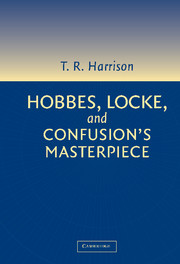 Hobbes, Locke, and Confusion's Masterpiece
Hobbes, Locke, and Confusion's Masterpiece 7 - Disobedient Locke
Published online by Cambridge University Press: 05 June 2012
Summary
First, natural law, state of nature, the objective, correct, moral law governing all things and all peoples. Then, government, political societies, particular authorities that can create positive law. Starting with one, we are meant to reach the other. Whether we do, and how we do, depends, of course, on our understanding of both natural law and government. We have seen the somewhat uncertain basis Locke gives himself in natural law. Now we have to see what he can erect on this by way of government. We have to examine how or whether he can use the law that he has propounded in order to provide a legitimate basis for states, governments, political authorities.
This is one problem, the problem of political obligation. In fact, Locke has a double problem. As well as the problem of obedience, he also has the problem of disobedience. Both have to be justified. Yet the two problems are not only contrasting but also potentially conflicting. The general structure of the answer to the first problem – the problem of why we should obey – is to make use of the idea of a social contract or agreement. As with the earlier users of this device we have examined, the answer to why we are subject to government is that we subject ourselves. By consent or agreement, we construct a political society and bind ourselves to obey its government.
- Type
- Chapter
- Information
- Hobbes, Locke, and Confusion's MasterpieceAn Examination of Seventeenth-Century Political Philosophy, pp. 190 - 218Publisher: Cambridge University PressPrint publication year: 2002


